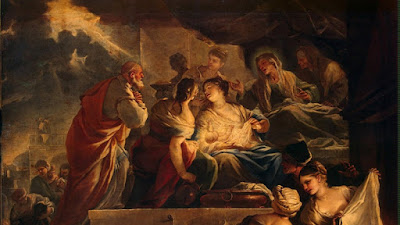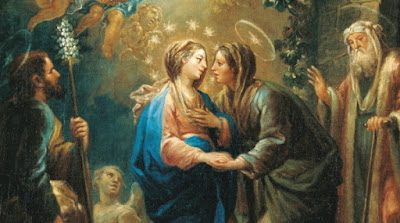Besides being the Feast of the Most Precious Blood of our Lord Jesus Christ, today is traditionally the Octave Day of St. John the Baptist. Today is also still part of the Octave of Ss Peter and Paul.
The Mass for the Octave Day is below:
INTROIT Isaias 49: 1-2
From the womb of my mother the Lord hath called me by my name, and He hath made my mouth like a sharp sword; in the shadow of His hand He hath protected me, and hath made me as a chosen arrow. V. (Ps. 91: 2) It is good to give praise to the Lord, and to sing to Thy name, O Most High. v. Glory be…etc
COLLECT
O God, Who hast made this day honorable to us on account of the birth of blessed John, grant Thy people the grace of spiritual joys, and direct the minds of all the faithful in the way of everlasting salvation. Through our Lord Jesus Christ, Thy Son, Who liveth and reigneth with Thee in the unity of the Holy Ghost, God, Forever and ever.
Commemoration of Octave of SS Peter & Paul
O God, Who hast consecrated this day to the martyrdom of Thine apostles Peter and Paul, grant to Thy Church in all things to follow their teaching from whom it received the right ordering of religion in the beginning. Through our Lord Jesus Christ, Thy Son, Who liveth and reigneth with Thee in the unity of the Holy Ghost, God, Forever and ever.
May the prayer of Thine apostles, O Lord, accompany the sacrifices which we offer to be consecrated to Thy name, and through it do Thou grant us to be pardoned and defended. Through our Lord Jesus Christ, Thy Son, Who liveth and reigneth with Thee in the unity of the Holy Ghost, one God Forever and ever.
Preserve, O Lord from all dangers, by the intercession of Thine apostles, those whom Thou hast filled with Heavenly nourishment. Through the same Lord Jesus Christ, Thy Son, Who liveth and reigneth with Thee in the unity of the Holy Ghost, one God, For ever and ever.
EPISTLE Isaias 49: 1-3, 5-7
Lesson from Isaias the Prophet. Give ear, ye islands, and harken, ye people from afar. The Lord hath called me from the womb, from the bowels of my mother He hath been mindful of my name. Arid He hath made my mouth like a sharp sword; in the shadow of His hand He hath protected me, and hath made me as a chosen arrow; in His quiver He hath hidden me. And He said to me,Thou art My servant Israel, for in thee will I glory. And now saith the Lord that formed me from the womb to be His servant. Behold I have given thee to be the light of the gentiles, that thou mayest be My salvation even to the farthest part of the earth. Kings shall see, and princes shall rise up, and adore for the Lord’s sake, and for the Holy One of Israel Who hath chosen thee.
GRADUAL/ALLELUIA Jeremias 1: 5, 9
Before I formed thee in the bowels of thy mother, I knew thee: and before thou camest forth out of the womb, I sanctified thee. V. The Lord put forth His hand, and touched my mouth: and said to me. Alleluia, alleluia. V. (Luke 1: 76) Thou, child, shalt be called the Prophet of the Highest; thou shalt go before the Lord to prepare His ways. Alleluia.
GOSPEL Luke 1: 57-68
Elizabeth’s full time of (being delivered was come, and she brought forth a son, And her neighbors and kinsfolk heard that the Lord had showed His great mercy towards her, and they congratulated with her. And It came to pass, that on the eighth day they came to circumcise the child, and they called him by his father’s name, Zachary. And his mother answering, said Not so, but he shall be called John. And they said to her, There is none of thy kindred that is called by that name. And they made signs to his father, how he would have him called. And demanding a writing-table, he wrote, saying, John is his name: and they all wondered. And immediately his mouth was opened, and his tongue loosed; and he spoke, blessing God. And fear came upon all their neighbors; and all these things were noised abroad over all the hill country of Judea; and all they that had heard them, laid them up in their heart, saying, What a one, think ye, shall this child be? For the hand of the Lord was with him. And Zachary his father was filled with the Holy Ghost; and he prophesied, saying, Blessed be the Lord God of Israel; because He hath visited, and wrought the redemption of His people.
OFFERTORY ANTIPHON Psalm 91: 13
The just man shall flourish like the palm-tree; he shall grow up like the cedar of Lebanon.
SECRET
We heap Thine altars with gifts, O Lord, celebrating with fitting honor the nativity of him who heralded the coming of the Saviour, and pointed Him out when He had come,Our Lord Jesus Christ, and reignest, in the unity of the Holy Ghost, God. Through our Lord Jesus Christ Thy Son our Lord, Who liveth and reigneth with Thee in the unity of the Holy Ghost, one God Forever and ever.
Commemoration of the Octave of SS Peter & Paul
PREFACE of the Blessed Trinity
It is truly meet and just, right and for our salvation, that we should at all times, and in all places, give thanks unto Thee, O holy Lord, Father almighty, everlasting God. Who, together with Thine only-begotten Son, and the Holy Ghost, art one God, one Lord: not in the oneness of a single Person, but in the Trinity of one Substance. For what we believe by Thy revelation of Thy glory, the same do we believe of Thy Son, the same of the Holy Ghost, without difference or separation. So that in confessing the true and everlasting Godhead, distinction in persons, unity in essence, and equality in majesty may be adored. Which the angels and archangels, the cherubim also and seraphim do praise: who cease not daily to cry out, with one voice saying:
COMMUNION ANTIPHON Luke 1: 76
Thou, child, shalt be called the Prophet of the Highest; for thou shalt go before the face of the Lord, to prepare His ways.
POSTCOMMUNION
May Thy Church, O God, be joyful at the birth of blessed John the Baptist, through whom she knew the Author of her regeneration, our Lord Jesus Christ,Thy Son. Who with Thee livest and reignest, in the unity of the Holy Ghost, God. Through the Lord Jesus Christ, Thy Son, Who liveth and reigneth with Thee in the unity of the Holy Ghost, one God For ever and ever.
Commemoration of Octave of SS Peter & Paul
Unloose, great Baptist, our sin-fettered lips;
That with enfranchis'd voice we may proclaim
The miracles of thy transcendent life,
Thy deeds of matchless fame.
Oh, lot sublime! an angel quits the skies,
Thy birth, thy name, thy glory to declare
Unto thy priestly sire; while to the Lord He offers
Israel's prayer.
Mistrustful of the promise from on high,
His speech forsakes him at the angel's word;
But thou on thine eighth day dost re-attune
For him the vocal chord.
No marvel; since yet cloister'd in the womb,
The presence of Thy King had thee inspir'd;
What time Elizabeth and Mary sang
With joy prophetic fir'd.
Immortal glory to the Father be,
With his Almighty sole-begotten Son,
And Thee, co-equal Spirit, One in Three,
While endless ages run.
Amen.










.jpg)
.jpg)










